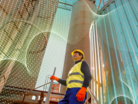CarbonKerma launches Innovative Carbon Credit Marketplace

CarbonKerma has launched an innovative carbon credit trading platform–the world's first and only carbon marketplace singularly focused on Carbon Capture, Utilization, and Storage (CCUS)-derived carbon credits.
The platform combines carbon capture and blockchain technology to offer CO2 emitting companies a high quality, trackable and measurable carbon credit trading platform. All the credits listed on CarbonKerma are precisely measured, highly regulated, and verified through stringent Measurement, Reporting, and Verification (MRV) processes.
The importance of CCUS to our climate goals
The Intergovernmental Panel on Climate Change (IPCC) and the International Energy Agency (IEA) both acknowledge that CCUS must play a strong role in meeting the Paris Accord climate targets.
In the IEA’s Sustainable Development Scenario, “CCUS accounts for nearly 15% of the cumulative reduction in emissions,” with a growing contribution over time, extending to “... almost all parts of the global energy system.”
The IPCC states that the “use of CCS in conjunction with other measures could significantly reduce the cost of achieving stabilisation and would increase flexibility in achieving these reductions.”
Put simply, without deploying CCUS at scale, our global climate targets cannot be met:
CarbonKerma’s implementation of blockchain technology
Additionally, CarbonKerma’s use of blockchain technology brings liquidity to the marketplace and lends to our carbon offset credits a quality that is dearly needed in the voluntary carbon markets–transparency.
Each metric tonne of CO2 sequestered is represented by a digital asset, CKT, which can be traded and retired. Once retired, it is permanently removed from circulation, never to be traded again.
The immutability, public auditability, and transparency characteristics of blockchain technology means offsetting unabatable emissions can be a fully transparent endeavour for our partners.
Companies can use CarbonKerma’s carbon credit platform to offset their emissions as part of their decarbonisation efforts, with 100% certainty that every CKT token they buy and retire represents a proven tonne of sequestered CO2.
Heavy manufacturing and construction sectors set to benefit
There is growing pressure on all sectors to decarbonise and look for ways to reduce their carbon emissions. For heavy manufacturers, those pressures are compounded by their innate difficulties in abating their emissions. Cement producers, steelmakers, automobile manufacturers and chemical and fertiliser producers all face an uphill battle entirely removing CO2 emissions from their operations.
This is particularly onerous when manufacturers need to consider emissions all along their production and supply chains: Scope 1, 2, and 3 emissions.
The World Economic Forum has found that “one-fifth of the world's carbon emissions come from the manufacturing and production sectors” and that a full understanding of the Production Carbon Footprint (PCF) is challenging.
While emissions reductions and PCF evaluation measures are being undertaken by most of the world’s largest manufacturers, there is increasing public awareness of the need for emission-heavy industrial sectors to decarbonise as rapidly as possible.
Carbon offsets can help close the gap between a company’s ability to decarbonise through technological advancements over time and their ESG goals.
But integrity in carbon markets is vital.
By combining the proven technology of CCUS and the use of a publicly auditable blockchain, CarbonKerma carbon offset credits are the highest quality credits in the marketplace:
Furthermore, offsetting through Carbon Capture provides potential additional benefits to developing nations where many manufacturers have facilities. For the ‘global south’ to industrialise, they will need the same access to the reliable sources of energy that the west enjoyed for the past hundred years.
For construction companies, the UN Environment Programme found the sector was off-track to decarbonise by 2050, despite an “increase in energy efficiency investment and lower energy intensity.”
Decarbonisation in the sector is challenging. Despite more energy efficient operations and buildings, it continues to rely on raw materials that are carbon-intensive. The same report found that:
“Raw resource use is predicted to double by 2060 – with steel, concrete and cement already major contributors to greenhouse gas emissions. Materials used in the construction of buildings already account for around nine per cent of overall energy-related CO2 emissions.”
While investments are being made in lower carbon alternative raw materials or components thereof, the pace of global growth and the approaching deadlines for companies to meet their climate commitments are placing pressure on all sectors to meet sustainability mandates within ever-shrinking windows of time.
The positive impact on the developing world
The deployment at-scale of CCUS will enable less-developed nations to grow and urbanise and enjoy all the benefits associated with that, including improved access to clean drinking water and sanitation, better health care and health outcomes and longer and more productive lives and livelihoods.
They can only do that if they have access to the same reliable sources of cheap and abundant energy the west has had. And the only way they can do that in a carbon neutral manner is through the deployment of CCUS at energy production facilities.
CarbonKerma intends to permanently sink 50bn tonnes of CO2 by 2050, in line with the Paris Climate Accord goals. With the commitment of partners in manufacturing and construction that have hard-to-abate emissions, that goal is in reach.



